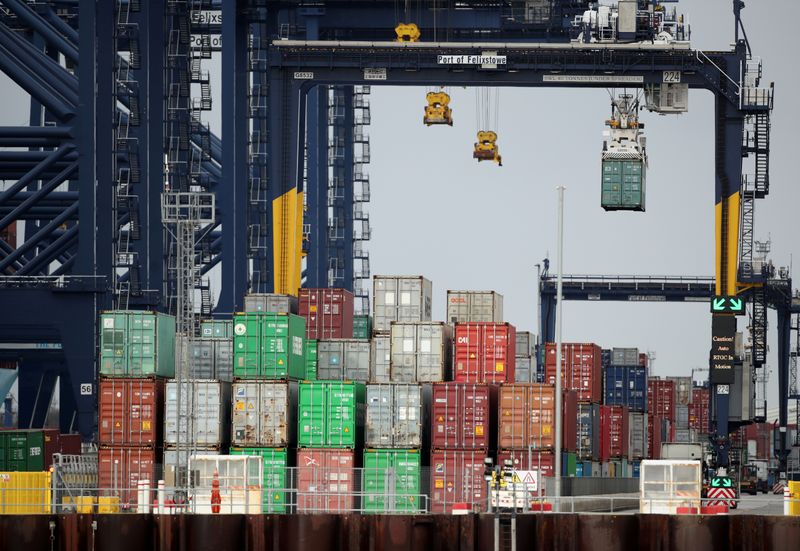By David Milliken and William Schomberg
LONDON (Reuters) -British goods exports to the European Union rose to their highest since October 2019 in May, official data showed on Friday, reversing a slump at the start of 2021 when Britain exited the bloc's single market and customs union.
Britain's government is likely to view the data as backing its expectation that the change in customs arrangements would only cause temporary inconvenience to most businesses.
However, overall trade with the EU has lagged behind growth in sales to the rest of the world, and business groups said they still faced extra red tape dealing with European customers and suppliers as a result of Brexit.
"While we are seeing a modest pick-up in demand for UK goods in the last month as economies reopen, the overall climate remains fragile," the head of trade policy at the British Chambers of Commerce, William Bain, said after the data.
Britain's Office for National Statistics said goods exports to the European Union, excluding precious metals, rose to 14.0 billion pounds ($19.4 billion) in May on a seasonally adjusted basis, their highest since October 2019 and almost twice January's level.
Total goods exports of 27.9 billion pounds, excluding precious metals, were the highest since January 2020, just before the coronavirus pandemic began to cause disruption.
Imports from the EU have also risen after a slump at the start of the year, when COVID-19 disrupted traffic across the English Channel, although they remain slightly below imports from the rest of the world. Before 2021, Britain almost always sourced most of its imports from the EU.
The head of Britain's biggest port - Dover (NYSE:DOV) - told Reuters trade disruption could return if British holidaymakers head for European summer breaks, adding to strain on stretched customs staff.
LONG-TERM EFFECT HARD TO MEASURE
Britain formally left the EU at the end of January 2020, and remained in the EU's single market and customs union for a further 11 months while it negotiated a trade agreement.
Teasing out the longer-term impact of Brexit is made harder by the slump in exports caused by COVID-19 last year, and brinkmanship in Britain's parliament in 2018 and 2019 that led to periodic fears of potential sudden border checks.
The Bank of England said last year it expected a long-term reduction in trade with the EU. Some smaller businesses - especially those selling fresh produce such as seafood - face big regulatory hurdles.
Comparing the first five months of 2021 with the same period of 2020 - which includes the severe initial impact of COVID - trade with countries outside the EU grew faster.
British exports outside the EU increased by 8%, while those to the EU rose by 5%. Imports from the EU were broadly flat while imports from further afield rose by 19%.
"The longer-term picture ... shows the severe headwinds of the pandemic, rising raw material and shipping costs, and ongoing Brexit red tape are having on the ability of UK businesses to trade with EU customers," Bain said.

The British figures on exports to the EU contrast sharply with recent data from Eurostat. This showed a 27% fall in EU imports from Britain for the first four months of 2021, due largely to a change in methodology on Jan. 1 to no longer count goods shipped from Britain which originated further afield.
The ONS said its figures were more consistent when comparing exports over time. ($1 = 0.7227 pounds)